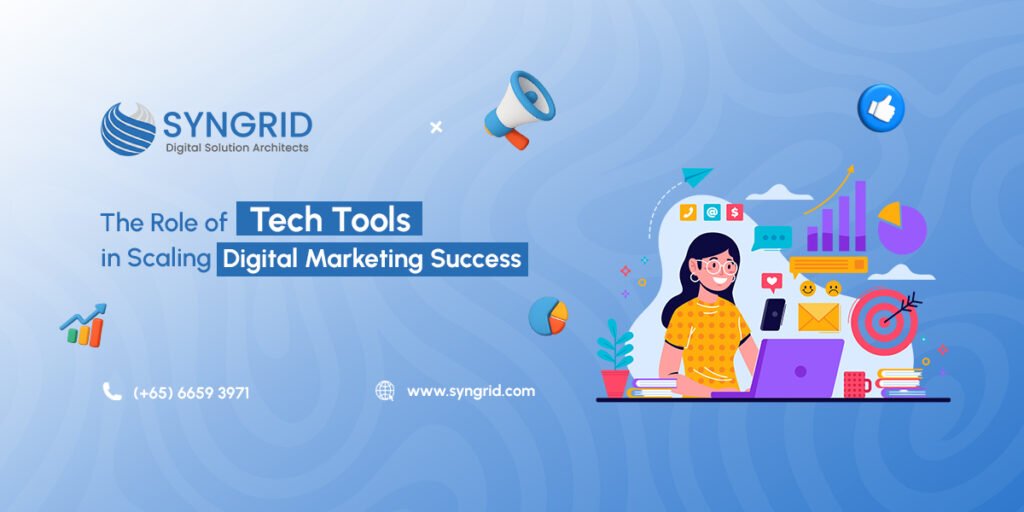
The Role of Tech Tools in Scaling Digital Marketing Success
The digital marketing landscape in 2025 is more competitive than ever. Businesses aren’t just competing for visibility they’re competing for attention, trust, and long-term loyalty. Creativity and strategy remain essential, but without technology, campaigns struggle to reach their full potential.
This is where tech tools in digital marketing step in. From automation platforms and CRMs to SEO analytics and AI-powered personalization, these tools are no longer “nice to have” they are the backbone of scalable success. And with the support of providers like Syngrid digital marketing services, businesses can transform technology into measurable growth.
Why Tech Tools Are Essential in 2025
A decade ago, a marketing team could manually schedule posts, send newsletters, and track performance with spreadsheets. In 2025, that’s impossible. Customer expectations are higher, data is richer, and competition is sharper.
Tech tools bridge this gap by helping businesses:
- Save time through automation.
- Understand audiences with detailed analytics.
- Personalize at scale with AI-driven insights.
- Optimize campaigns for higher ROI.
- Integrate systems (CRM, websites, social) into one ecosystem.
Simply put, businesses that adopt the right digital marketing technologies scale smarter, faster, and more sustainably.
Automation: The Engine of Efficiency
Imagine sending welcome emails to every new subscriber, posting to five social channels daily, and following up with abandoned carts all manually. It’s inefficient and error-prone.
Automation solves this. Tools now:
Trigger personalized email sequences.
Schedule social media campaigns weeks in advance.
Deliver timely reminders and promotions to the right audience.
For example, a small e-commerce store can set up a workflow where a user who abandons their cart automatically receives a reminder email and, if they don’t purchase within 48 hours, a discount code.
Analytics: Turning Data into Decisions
Data is the lifeblood of digital marketing but raw data without insights is meaningless. Modern analytics tools provide clarity by tracking:
Website traffic and user behavior.
Email open and click-through rates.
Social media engagement.
Conversion funnels and ROI.
For instance, analytics can reveal that blog posts optimized for long-tail keywords convert 3x better than generic ones. With this insight, marketers can shift strategy toward what actually drives growth.
SEO & Content Tools: Fueling Organic Growth
Despite new platforms and ad types, search engines remain the #1 way customers discover businesses. That’s why SEO is still vital.
Today’s SEO tools do more than keyword tracking they analyze competitors, optimize on-page content, and provide insights into search intent. Combined with content optimization tools, marketers ensure that every blog, product page, and landing page resonates with users and search engines alike.
When integrated with a broader digital marketing strategy, these tools turn organic traffic into a sustainable growth engine.
Email Marketing: Still the Highest ROI Channel
Email remains unbeatable in terms of ROI delivering $36 for every $1 spent (according to industry benchmarks). But in 2025, email marketing is no longer about bulk messages. It’s about precision and personalization.
Modern email platforms allow segmentation by behavior, demographics, or purchase history. For example, a SaaS company can send trial reminders to inactive users, upgrade offers to engaged ones, and renewal notices to current subscribers all automatically.
AI & Personalization: The Future of Engagement
Artificial Intelligence is redefining how brands interact with customers. From predictive analytics to AI-driven chatbots, personalization is becoming sharper and more human-like.
Examples include:
AI suggesting products based on browsing history.
Chatbots handling customer queries instantly.
Predictive algorithms identifying at-risk customers before they churn.
The Benefits of Tech-Driven Digital Marketing
Adopting tech tools brings tangible benefits:
Efficiency: Less manual work, more focus on strategy.
Scalability: Campaigns can grow without overwhelming teams.
Personalization: Customers feel valued, not spammed.
Data-Driven ROI: Smarter targeting reduces wasted ad spend.
Consistency: Integrated systems deliver seamless customer journeys.
These advantages directly impact both short-term campaign performance and long-term brand loyalty.
Looking Ahead: The Future of Tech Tools in Marketing
The next few years will bring even greater shifts. Emerging trends include:
Voice search optimization (as AI assistants dominate).
Blockchain for ad transparency and fraud prevention.
5G-driven experiences with faster, interactive campaigns.
Deeper hyper-personalization using real-time data streams.
Businesses that adopt these innovations early will lead the next era of digital marketing.
Conclusion
In 2025, the role of tech tools in digital marketing is no longer about “keeping up” it’s about staying ahead. Automation, analytics, SEO, email, and AI aren’t just tools; they’re the foundation of scalable success.
By embracing these technologies, businesses can run smarter campaigns, engage customers more effectively, and achieve higher ROI.
With the expertise of Syngrid digital marketing services, don’t just adopt tools they leverage them strategically to unlock sustainable growth in an increasingly competitive digital world.









